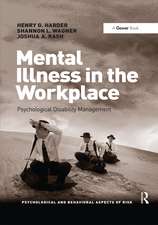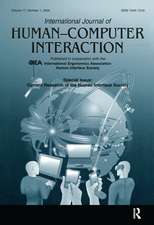Human Factors and Ergonomics of Prehospital Emergency Care
Editat de Joseph R. Keebler, Elizabeth H. Lazzara, Paul Misasien Limba Engleză Paperback – 10 dec 2019
| Toate formatele și edițiile | Preț | Express |
|---|---|---|
| Paperback (1) | 465.91 lei 6-8 săpt. | |
| CRC Press – 10 dec 2019 | 465.91 lei 6-8 săpt. | |
| Hardback (1) | 935.40 lei 3-5 săpt. | +22.27 lei 7-13 zile |
| CRC Press – 24 mar 2017 | 935.40 lei 3-5 săpt. | +22.27 lei 7-13 zile |
Preț: 465.91 lei
Nou
Puncte Express: 699
Preț estimativ în valută:
89.15€ • 97.14$ • 75.12£
89.15€ • 97.14$ • 75.12£
Carte tipărită la comandă
Livrare economică 23 aprilie-07 mai
Preluare comenzi: 021 569.72.76
Specificații
ISBN-13: 9780367870119
ISBN-10: 0367870118
Pagini: 262
Dimensiuni: 156 x 234 x 14 mm
Greutate: 0.37 kg
Ediția:1
Editura: CRC Press
Colecția CRC Press
ISBN-10: 0367870118
Pagini: 262
Dimensiuni: 156 x 234 x 14 mm
Greutate: 0.37 kg
Ediția:1
Editura: CRC Press
Colecția CRC Press
Cuprins
List of figures
List of Tables
Notes on contributors
Foreword
1. Introduction to Human Factors and Ergonomics of EMS
2. Cognitive Factors in Emergency Medical Services
3. Situation Awareness, Sociotechnical Systems, and Automation in Emergency Medical Services: Theory and Measurement
4. Naturalistic Decision Making in Emergency Medical Services
5. Stress and Performance in EMS
6. Expertise and Decision Making in EMS
7. Teams and Teamwork in Emergency Medical Services
8. Defining the Pre-Hospital Care Multiteam System
9. Cognitive Aids in Emergency Medical Services
10. Exploring Telemedicine in Emergency Medical Services: Guidance in Implementation for Practitioners
11. Communication and Patient Care Handover: Prehospital Emergency Preparation
12. Changes From Within: How Paramedic Services can Lead the Way Human Factors is Implemented in Healthcare
13. Disaster and Response in Emergency Medical Systems (EMS): Team Training to the Rescue
14. Resilience Engineering in Prehospital EMS
15. EMS Occupational Safety Issues, Implications, and Remedies
Index
List of Tables
Notes on contributors
Foreword
1. Introduction to Human Factors and Ergonomics of EMS
2. Cognitive Factors in Emergency Medical Services
3. Situation Awareness, Sociotechnical Systems, and Automation in Emergency Medical Services: Theory and Measurement
4. Naturalistic Decision Making in Emergency Medical Services
5. Stress and Performance in EMS
6. Expertise and Decision Making in EMS
7. Teams and Teamwork in Emergency Medical Services
8. Defining the Pre-Hospital Care Multiteam System
9. Cognitive Aids in Emergency Medical Services
10. Exploring Telemedicine in Emergency Medical Services: Guidance in Implementation for Practitioners
11. Communication and Patient Care Handover: Prehospital Emergency Preparation
12. Changes From Within: How Paramedic Services can Lead the Way Human Factors is Implemented in Healthcare
13. Disaster and Response in Emergency Medical Systems (EMS): Team Training to the Rescue
14. Resilience Engineering in Prehospital EMS
15. EMS Occupational Safety Issues, Implications, and Remedies
Index
Notă biografică
Joseph R. Keebler, PhD has over 10 years of experience conducting experimental and applied research in human factors, with a specific focus on training and teamwork in military, medical, and consumer domains. Joe currently serves as an assistant professor of human factors and systems at Embry Riddle Aeronautical University. Joe has led projects aimed at the implementation of human factors in complex, high-risk systems, to increase safety and human performance. This work includes command and control of tele-operated unmanned vehicles, communication and teamwork in medical systems, and development of simulation and gamification of training for advanced skills including playing the guitar and identifying combat vehicles. Joe’s work includes over 50 publications and over 60 presentations at national and international conferences.
Prior to being an Assistant Professor at Embry-Riddle Aeronautical University, Elizabeth Lazzara received her doctorate in Applied Experimental Human Factors Psychology from the University of Central Florida where she also conducted research at the Institute for Simulation and Training in Orlando, Florida. Although she has had extensive experiences in military, academic, and commercial settings, Dr. Lazzara’s primary interests lie within improving the quality of patient care within the healthcare domain. She strives to make a long lasting and significant impact by examining and advancing the science and practice of clinical care and patient safety issues pertaining to human performance, teamwork, team training, and simulation-based training, and performance measurement.
Paul Misasi has been a paramedic for thirteen years and currently serves as the Clinical Manager for Sedgwick County EMS (Kansas). He holds a Master of Science degree in Emergency Health Services from the University of Maryland, Baltimore County, a Master of Arts in Psychology and Bachelor of Science in Health Service Organization & Policy,
Prior to being an Assistant Professor at Embry-Riddle Aeronautical University, Elizabeth Lazzara received her doctorate in Applied Experimental Human Factors Psychology from the University of Central Florida where she also conducted research at the Institute for Simulation and Training in Orlando, Florida. Although she has had extensive experiences in military, academic, and commercial settings, Dr. Lazzara’s primary interests lie within improving the quality of patient care within the healthcare domain. She strives to make a long lasting and significant impact by examining and advancing the science and practice of clinical care and patient safety issues pertaining to human performance, teamwork, team training, and simulation-based training, and performance measurement.
Paul Misasi has been a paramedic for thirteen years and currently serves as the Clinical Manager for Sedgwick County EMS (Kansas). He holds a Master of Science degree in Emergency Health Services from the University of Maryland, Baltimore County, a Master of Arts in Psychology and Bachelor of Science in Health Service Organization & Policy,
Recenzii
"Everyone in a leadership position in any organization needs the information and perspectives in this book. It will save lots of wear and tear on your employees and it will improve your effectiveness."
— Mike Taigman, University of Maryland Baltimore County, USA
— Mike Taigman, University of Maryland Baltimore County, USA
Descriere
This book provides practical information for individuals who are involved in pre-hospital emergency care—from EMS practitioners to organizational leaders and research scientists. Relevant theories of human factors, including systems engineering principles, teamwork, training, and interfaced design are reviewed in light of the needs of current da



























